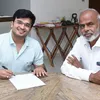PharmEasy on hiring, new appointments, and acquisitions
In a conversation with YourStory, Abhinav Yajurvedi and Dharmil Sheth of PharmEasy discuss the gear shifts
The week has been busy for the Mumbai and Bengaluru-based healthtech startup, . After five new CXO-level hires, it is now looking to hire more than 200 engineers for its new tech centres in Hyderabad, Delhi-NCR, and Pune.
It also made its second major acquisition — in a primary and secondary deal. According to a source close to the matter, Aknamed was valued at over $140 million. It is now a subsidiary of PharmEasy's holding entity API Holdings, and Aknamed's founders have exited the company.
While PharmEasy is currently in its silent period for the run for its IPO, YourStory caught up with Dharmil Sheth, Co-founder, PharmEasy, and Abhinav Yajurvedi, CTO, PharmEasy on the company's tech plans and the gear shifts the team has had to make.
Edited excerpts of the interview:

Dharmil Sheth, Co-founder PharmEasy
YourStory (YS): What shifts does a startup need to make while gunning for growth?
Dharmil Sheth (DS): For any startup, the early days of the journey are filled with experiments, learning, testing, validation from different stakeholders, failures, and there are a handful of stakeholders and investors. This gives room for experimentation.
But when you decide to go grow and scale further, you are answerable to millions of people who invest their savings into your journey and story.
It is only when you are confident and sure of the core of the business, you will keep scaling up on categories and geographies and strengthening you're offering. There has to be a lot more financial and commercial discipline in the way people do things.
For example, pre-IPO Zomato could possibly try anything to scale, but now they also have to focus on costs. Keeping everything in mind, you have to ensure that the stakeholders get their returns and you stay true to your journey.
YS: Tell us about PharmEasy's plans. What is the plan with these hirings?
DS: Amidst the pandemic, we were all working remotely and thought how do we make use of this opportunity to build out a network, regionally, and creating talent pools, across different cities where talent is available.
We thought of touching Hyderabad, Pune, and Delhi-NCR region. The idea is to build out these centres with good enough tech leaders, who build out teams that work out of these zones. The HO will remain in Bengaluru and Mumbai.
The technology, product and main core tech functions will still be stationed out of Bengaluru.
We are looking to build out the finest talent pools across the country and the vision is to build India's largest healthcare ecosystem that is seamlessly integrated.

Abhinav Yajurvedi, CTO, PharmEasy
YS: What are the main focus areas on the tech front for PharmEasy now?
Abhinav Yajurvedi (AY): Most people see us as a B2C commerce entity, hence the 200 hires look large. But PharmEasy is more diverse. We have a more comprehensive approach to the healthcare ecosystem beyond B2C or medicine delivery.
We are more like vertical-focused ecommerce companies, where we now aim to build more capabilities towards the B2B side of the ecosystem, diagnostic, delivery, and doctor-patient consultation.
We are solving deep problems in the healthcare ecosystem. And all of this needs to work together as in the Indian healthcare ecosystem to make a dent. You need it all — access to medicines, doctors, diagnostics, and only then an impact can be made.
The kind of problems we are solving needs us to have a solid tech background. It is glamorous to see the B2C side of the ecosystem. It is a comprehensive approach we are looking at.
These centres will focus on new products, new initiatives, as well as core products. Each centre will have its unique importance and be a part of the whole.
YS: How does a company focus on scale, experiment, and tech as it grows and scales?
DS: The way our journey has matured and the kind of people we have indicate strong visibility on what is needed from every team member, every day, week, and month.
There is planning to the last dot, and this goes down to planning what everyone is working every hour, how many hours are needed for a certain thing, and so on and so forth.
This support ensures that people don't have to worry about the planning bit, and there is good visibility between plans and actuals.
This has to be culturally driven in the company to get people to commit and live up to what they commit. The idea is to get the team to act quickly and ensure that we hit our targets on time.
AY: The fundamental way to look at it is to find entrepreneurs within an organisation. We operate in a multi-startup way, we have leaders for each vertical, and each operates as mini startups.
The organisation needs to operate on a single set of operations decided top-down and bottom-up, and even have the freedom to run their own show within the organisational parameters.
Edited by Saheli Sen Gupta








